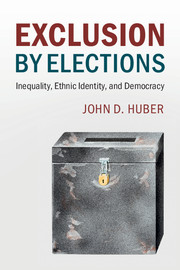Book contents
- Frontmatter
- Contents
- List of Figures
- List of Tables
- Acknowledgments
- 1 Introduction
- 2 Why Worry about Inequality and Ethnic Politics?
- PART I THE THEORETICAL ARGUMENT
- PART II EMPIRICAL EVIDENCE FOR THE ARGUMENT
- 6 Theory and Causal Identification
- 7 Income and Voting Behavior
- 8 Inequality, Ethnic Diversity, and the Ethnification of Party Systems
- 9 Social Structure, Redistribution, and Democratic Transitions
- 10 Conclusion: Inequality and the Politics of Exclusion
- References
- Index
- Miscellaneous Endmatter
10 - Conclusion: Inequality and the Politics of Exclusion
from PART II - EMPIRICAL EVIDENCE FOR THE ARGUMENT
Published online by Cambridge University Press: 18 May 2017
- Frontmatter
- Contents
- List of Figures
- List of Tables
- Acknowledgments
- 1 Introduction
- 2 Why Worry about Inequality and Ethnic Politics?
- PART I THE THEORETICAL ARGUMENT
- PART II EMPIRICAL EVIDENCE FOR THE ARGUMENT
- 6 Theory and Causal Identification
- 7 Income and Voting Behavior
- 8 Inequality, Ethnic Diversity, and the Ethnification of Party Systems
- 9 Social Structure, Redistribution, and Democratic Transitions
- 10 Conclusion: Inequality and the Politics of Exclusion
- References
- Index
- Miscellaneous Endmatter
Summary
This book argues that social structure influences whether ethnic or class identities become the targets of distributive benefits in democratic electoral competition. The argument is based on the premise that voters will support parties that can credibly commit to offering the greatest material gain, and that political parties form in an effort to gain rents (by winning) or influence policy (in losing). Parties that represent the smallest majorities have an advantage because they can offer more to their supporters. As a consequence, when inequality is sufficiently low, class politics has an advantage (because low inequality is associated with a smaller number of voters receiving distributive benefits under class politics) and when ethnic polarization is high, ethnic politics has an advantage (because high ethnic polarization is associated with a smaller number of voters receiving distributive benefits under ethnic politics). But what it means for inequality or ethnic polarization to be low depends on the value of the other variable: a particular level of inequality may be “high” in a country with low ethnic polarization and may be “low” in a country with high ethnic polarization. For this reason, to understand how social structure influences electoral politics, we need to consider the interaction of inequality and ethnic diversity. Chapter 4 suggests that this theoretical intuition is robust to a number of alternative assumptions about the nature of the electoral law, the source of government revenues and the number of ethnic groups. Chapter 5 also suggests that the intuition would be robust if we assumed that the class-based element of electoral competition unfolded along the lines of median voter models if class-based parties could imperfectly target benefits at the median voter.
A variety of evidence has been brought to bear in Chapters 7 through 9 regarding the predicted role of social structure. If social structure affects electoral competition in the way implied by the theory, the conditions leading to class versus ethnic politics should influence the relationship between individual income and voting behavior. The evidence in Chapter 7 finds this pattern in the data.
- Type
- Chapter
- Information
- Exclusion by ElectionsInequality, Ethnic Identity, and Democracy, pp. 183 - 192Publisher: Cambridge University PressPrint publication year: 2017



